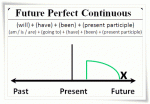 This post will show you how to use the Future Perfect Progressive, also called the Future Perfect Continuous. To see how to form the Future Perfect Progressive, click here.
This post will show you how to use the Future Perfect Progressive, also called the Future Perfect Continuous. To see how to form the Future Perfect Progressive, click here.
The Future Perfect Progressive tense is not very common and it’s a bit difficult to make. However, at higher levels it is great to understand it, and maybe even use it sometimes too. It has a very precise meaning, which can be convenient.
We use the Future Perfect Progressive to talk about an ongoing action that takes place before a certain time in the future, or to emphasize a course of action. We often use the Future Perfect Progressive to round up to an even number. We like whole, round numbers and this tense allows us to use those numbers.
A future time expression is usually stated or implied, often with by. This can go at the beginning or end of the sentence with no difference in meaning.
- By the year 2020, linguists will have been studying Indo-European languages for 200 years. (This is easier than saying that now, in 2015, linguists have been studying Indo-European languages for 195 years. It’s easier to just round up to 200)
- We will have been driving for six hours by the time we get home.
- By next March, I will have been teaching here for three years.
- By the end of this month, we will have been living together for six months.
